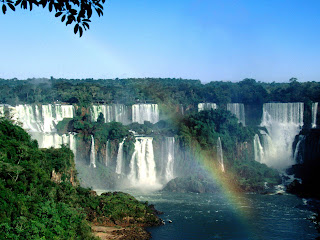Following more than three centuries under Portuguese rule, Brazil gained its independence in 1822, maintaining a monarchical system of government until the abolition of slavery in 1888 and the subsequent proclamation of a republic by the military in 1889. Brazilian coffee exporters politically dominated the country until populist leader Getulio VARGAS rose to power in 1930. By far the largest and most populous country in South America, Brazil underwent more than half a century of populist and military government until 1985, when the military regime peacefully ceded power to civilian rulers. Brazil continues to pursue industrial and agricultural growth and development of its interior. Exploiting vast natural resources and a large labor pool, it is today South America's leading economic power and a regional leader, one of the first in the area to begin an economic recovery. Highly unequal income distribution and crime remain pressing problems. In January 2010, Brazil assumed a nonpermanent seat on the UN Security Council for the 2010-11 term.
Characterized by large and well-developed agricultural, mining, manufacturing, and service sectors, Brazil's economy outweighs that of all other South American countries, and Brazil is expanding its presence in world markets. Since 2003, Brazil has steadily improved its macroeconomic stability, building up foreign reserves, and reducing its debt profile by shifting its debt burden toward real denominated and domestically held instruments. In 2008, Brazil became a net external creditor and two ratings agencies awarded investment grade status to its debt. After record growth in 2007 and 2008, the onset of the global financial crisis hit Brazil in September 2008. Brazil experienced two quarters of recession, as global demand for Brazil's commodity-based exports dwindled and external credit dried up. However, Brazil was one of the first emerging markets to begin a recovery. Consumer and investor confidence revived and GDP growth returned to positive in 2010, boosted by an export recovery. Brazil's strong growth and high interest rates make it an attractive destination for foreign investors. Large capital inflows over the past year have contributed to the rapid appreciation of its currency and led the government to raise taxes on some foreign investments. President Dilma ROUSSEFF has pledged to retain the previous administration's commitment to inflation targeting by the Central Bank, a floating exchange rate, and fiscal restraint.
Source : https://www.cia.gov/library/publications



2 comments:
nice blog brother...ehehe
keep posting!
visit mine:
http:agusurachman.wordpress.com
Thx. :D
Hahhaha_
Ty kapten muklis for visit my blog..
wow_u use wordpress...
that's cool...
I have one wordpress too bro!!
but it's difficult to develop that blog.hahahahaha!!!
I will visit yours Mr agus surachman!!
Post a Comment